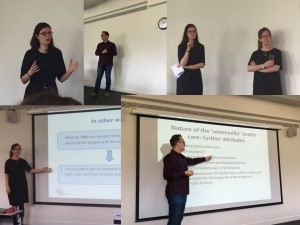Rural places share a set of challenges, including outmigration of young people, concentrations of older people, constrained economic opportunities, difficulties attracting specialist workers, low volume, but ongoing demand for health, social and transport services. At the same time it is suggested that social enterprise could help rural communities to respond to deal with social and economic challenges and become more resilient. However, are social enterprises and collective action of social entrepreneurship an ideal solution for rural places?
It might be considered that rural areas represent a perfect nurturing ground for social enterprise and social entrepreneurship because of the existence of reciprocity, collective activity and generally those aspects which are associated with being part of a rural community. It could be surmised that social enterprise might therefore build on this extant solidarity. Conversely, however, there are a number of reasons why rural areas might be particularly difficult locations for developing social entrepreneurship. At an operational level such areas are challenged by isolation, lack of economy of scale, transport issues and staff recruitment and retention.
Although social enterprises and social entrepreneurship activities of the third sector organisations and communities are prevalent in rural areas, research evidence in relation to rural social entrepreneurship and rural social enterprise is scattered. Consequently, and as there is a lack of reliable good quality academic publications in this field, we propose to organise a special issue addressing the existing knowledge gap.
Working together with the Journal of Rural Studies, Dr Artur Steiner from the Yunus Centre at Glasgow Caledonian University, Prof Jane Farmer from LaTrobe University and Dr Gary Bosworth from Lincoln University invite to explore the highlighted issues through editing a Special Issue on “Rural Social Enterprise and Social Entrepreneurship” . The special issue seeks to explore the significance of context when enacting social enterprise and social entrepreneurship in rural areas and focused on the following themes:
- Examples of rural social enterprise best practice in establishment, operation, outcomes and impacts
- Rural social enterprise as a response to public service retrenchment
- Opportunities and challenges for social enterprises delivering rural services and/or producing goods for sale
- Operating social enterprise within the realities of social and economic life in rural places
- Social enterprise operations, functioning and governance in remote, rural and regional contexts
- Social enterprises and their relationships with commercial businesses in rural places
- Outcomes of rural social enterprises – e.g. resilience, capacity, wellbeing
- Technology and rural social enterprise
- Novel ways of measuring social enterprise impact in rural context
- Communities and/or individuals as rural social entrepreneurs
- Examples of rural social entrepreneurs – how they work, are motivated and how they navigate rural social, cultural and economic realities
- Social entrepreneurship qualities and skills
- Innovation and rural social entrepreneurship
Rural social enterprise and social entrepreneurship – Journal of Rural Studies call for papers (2)
For more information about the Special Issue on “Rural Social Enterprise and Social Entrepreneurship”, please contact Artur Steiner (Artur.steiner@gcu.ac.uk).



